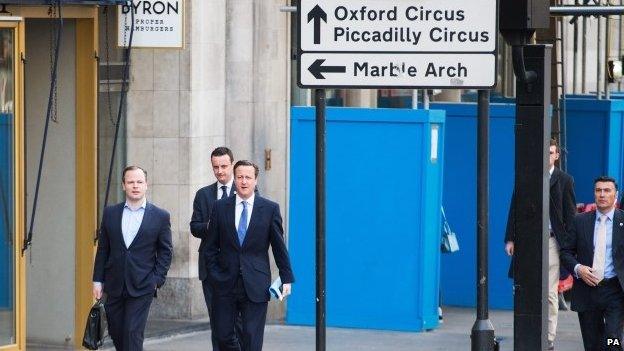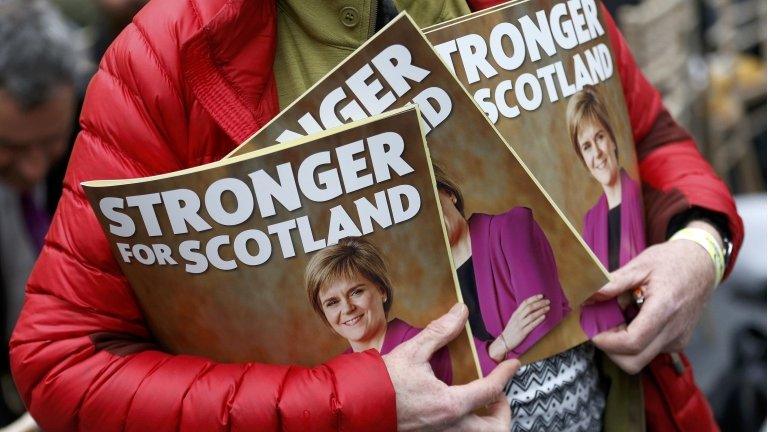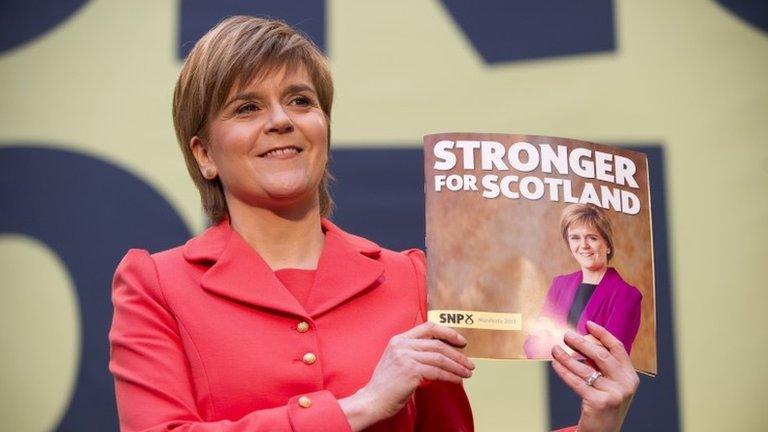Cameron says Labour-SNP government is 'frightening'
- Published

David Cameron says handing more powers to Scotland will have implications for the rest of the UK
The prospect of a Labour government propped up by the SNP is a "match made in hell", David Cameron has warned.
Speaking as the SNP launched its manifesto in Edinburgh, the PM said voters could be "sleepwalking" towards electing a government that would lead the country to "economic ruin".
A Conservative government would review Scottish devolution to ensure the rest of the UK will not "lose out", he said.
But SNP First Minister Nicola Sturgeon said she would resist the plan.
The clash came as the SNP, riding high in polls in Scotland, launched its manifesto.
'Clear and present dangers'
Labour said the Conservatives were "talking up" the threat of the SNP for their own political interests.
But Mr Cameron said the rise in support for the SNP in Scotland meant the stakes in the election have "just got much, much higher".
In other election news:
Labour begins a week of campaigning on the NHS, accusing the Conservatives of a "double deceit" over funding
Nick Clegg will pledge to restrict the scope for ministers to "interfere" with school curriculums and exams
Sinn Fein launches its election manifesto
The Green Party will launch its "youth manifesto"
Monday is the last possible day to register to vote in the 2015 general election
Campaigning in the North West of England, Mr Cameron said it was "a fact" that Labour could not form a government after 7 May without the support of the SNP.
He said that posed three "clear and present dangers" to Britain: the end of economic growth; a government "grinding to a halt" amid vote-by-vote negotiations with the SNP, and cancellation of infrastructure projects in England.
It was his "duty as prime minister" to warn that the choice facing voters had "just got far more harrowing", he said.
'Stakes are high'
"I want everyone to be very clear before they vote that there's a simple choice.
"You can vote for the Conservative party which will continue the long-term plan that's working - or you can put all that at risk, not only with Ed Miliband, who opposed every part of that plan, but also backed by SNP who would... really damage our country and the way that it works.
"The stakes, frankly, have just got much, much higher and the prospects of an Ed Miliband-SNP government I think frankly are very frightening."
Mr Cameron also warned that the SNP's opposition to Trident would "hold up" defence investment.

Analysis by economics editor Robert Peston
John Swinney, the SNP's deputy First Minister of Scotland, told the BBC's Today programme this morning that the heart of its manifesto would be to end austerity in the UK as a whole, and would support Labour to bring that about.
This may sound great for Labour and Ed Miliband. But it is in fact pretty much his worst nightmare.

He spoke out as polling suggested no party will win an overall majority on 7 May and the SNP could be the UK's third largest party.
He said a future Conservative government would introduce a new "mechanism" to ensure England, Wales and Northern Ireland were not disadvantaged as a result of the granting of new financial powers to the Scottish Parliament - a vow made by all the Westminster parties in the days running up to September's independence referendum.
He would honour the devolution pledge to Scotland but said that the changes - such as handing over responsibility for air passenger duty to Holyrood - could have a knock-on effect on the rest of the UK.
But Ms Sturgeon made clear she would resist the plan, telling her party's manifesto launch: "Let me say this to David Cameron - we will oppose any effort to undermine the Scottish Parliament."

Analysis by political correspondent Carole Walker
David Cameron is out campaigning in marginal seats across the north-west but his real focus is further north on what he says is the threat posed by the SNP to the rest of the UK.
The Conservative leader has been using ever more spine-chilling language to warn of the dangers if Labour get into power with the support of the SNP.
Both Labour and the SNP have ruled out a coalition, but the Tories have seized on comments from Labour's Angela Eagle, who said her party would talk to any other party represented at Westminster to get its Queen's Speech through, as evidence of the potential of some form of deal.
The danger for the Conservatives is that voters will be put off by such such a negative message, effectively trying to scare voters south of the border into backing them.
The issue will undoubtedly overshadow David Cameron's other theme on jobs - pledging that 60% of new jobs will be outside London and the south east of England, the same ratio as over the past five years.
It is a risk Conservative strategists believe is worth taking as they strive to get some fresh momentum into their campaign.

The SNP would seek to use its influence after the election to form a "progressive alliance" at Westminster and seek an end to austerity, she said.
Labour has ruled out any coalition with the SNP but the Conservatives have claimed that a minority Labour government could effectively be "propped" up by Nicola Sturgeon's party, with implications for the rest of the UK.
Under Mr Cameron's plans, the chancellor would lead an annual audit of Scottish devolution and its wider impact, reporting to Parliament.
'Radical choices'
"It will look at what effect Scottish government policies are having, whether it is changes to tax rates, business rates, or university tuition fees - or Scotland's powers over energy, agriculture, transport, and public services," he said.
"This is about making sure we understand the impact that devolution is having", and making sure that the rest of the country "never unwittingly loses out", he said.
Labour said the Smith Commission proposals for Scottish devolution, external - which have been broadly accepted by the Conservatives, Labour and the Liberal Democrats - already made arrangements to ensure the rest of the UK did not lose out.
Leader Ed Miliband will be campaigning later in Scotland as he seeks to check the SNP's advances.
In a speech to the Scottish TUC, Mr Miliband will say that Labour would legislate immediately to grant new powers to Scotland, contrasting this with the uncertainty of the possibility of another referendum in Scotland under the SNP.
A Labour government, he will say, would "make radical choices to change the lives of working people across Scotland" and introduce a Home Rule bill within 100 days enshrining additional powers for Holyrood.
- Published20 April 2015

- Published20 April 2015
